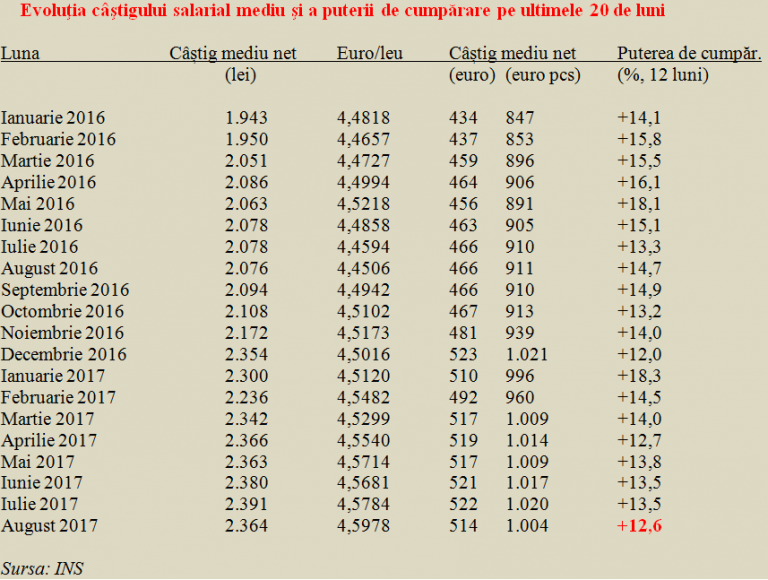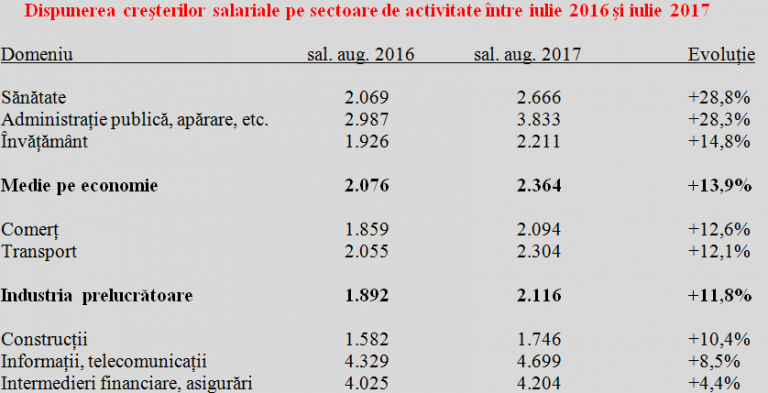 The average gross salary announced by INS for August 2017 was 3,290 lei, by 1.2% higher than in the previous month.
The average gross salary announced by INS for August 2017 was 3,290 lei, by 1.2% higher than in the previous month.
The net average wage was 2,364 lei, or 514 euros at the average exchange rate of September 2017 (the actual month of payment) or 1,004 euros in terms of purchasing power at the EU average prices.
Compared to the reference month of October 1990, the real monthly earning index dropped to 178.3% after reaching the 180% threshold in July. Although the growth rate compared to the same month of the previous year maintained at a very high level, namely 12.6% (see table), it remained more than double the growth recorded in the first half of 2017 (5.8%).
*
- Evolution of the average salary and the purchasing power in the last 20 months
- Month Net average wage Euro/leu Net average wage Purchasing power
*
Moreover, given the rise in the average euro/leu exchange rate close to the level of 4.60 lei/euro, the average net income dropped back to the psychological threshold of 1,000-euro in equivalent, calculated based on the average prices in the EU (to equal the real purchasing power).
List of anomalies: administration significantly exceeds health and education domains; manufacturing sector drops below 90% of average level
The largest percentage increases in national economy incomes continued to be in the budget sector, with the mention that the health domain and public administration had a rhythm about double the average registered at the level of the whole economy, while education was only slightly above this average.
It is also noteworthy the increase in the public administration over the previous month, while other public-sector employees had lower wages.
It can also be seen that the budget sector is at a level double the national average (which is likely to radically change the redistribution within the national economy) but also that an auxiliary activity such as the trade has outpaced the core source of the economic growth, namely the manufacturing sector.
Incomes of the employees in the manufacturing sector dropped for the first time in the last few years below 90% of the average incomes in the economy.
The explanation lies in the fact that the growth rate gap reached slightly more than two percent. The situation is totally atypical among the EU countries (the relation is inverted in most of them) and in continuous deterioration.
*
- Distribution of salary increases by sectors between July 2016 and July 2017
- Sectors Salary in August 2016 salary in August 2017 Change
- Health
- Public administration, defence etc.
- Education
- Average of the national economy
- Trade
- Transportation
- Manufacturing industry
- Construction
- IT&C
- Financial intermediation, insurance
*
While increases in the health sector suddenly lessened, from 36.5% in the previous month to 28.8% in August 2017, the public administration maintained the high rate of salary growth and came close to the health sector, although it started from a much higher level.
Thus, civil servants have now reached a favourable difference of 44% compared to those who work in the healthcare system and 73% (!) compare to the teachers.
The IT domain (which has made a remarkable contribution to this year’s economic growth) has maintained a robust rhythm of salary increases amid a certain shortage of qualified staff. Most likely, this level (8.5%) would have been the maximum level allowed by the macroeconomic developments in other sectors as well.
The only wages that remained below the GDP growth in terms of advance pace were the financial intermediation and insurance. Which should be a signal and give food for thought, at least in contrast to the hazardous measures already taken in the public sector, where a progressive wage growth has already been committed for the next period by 2022.











